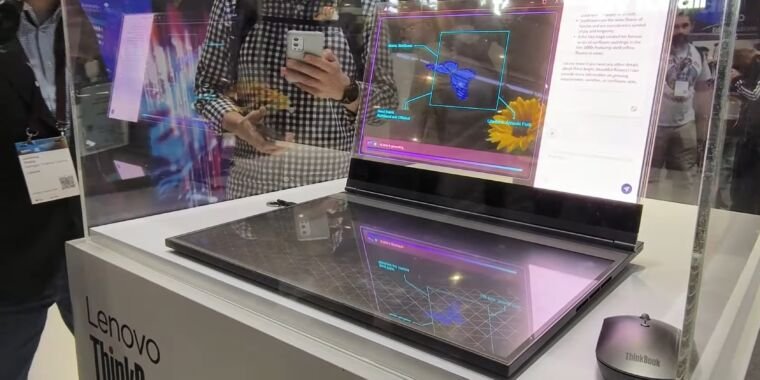-
Lenovo’s transparent laptop prototype on display at MWC 2024 this week, as captured by India Today.
-
Here, you can see what the see-through screen looks like from behind.
-
The laptop giving an AI demo.
-
Typing on the touchscreen keyboard doesn’t look comfortable.
-
A Lenovo-provided image of two of its transparent concept laptops.
Lenovo
In 2010, Samsung demoed a transparent laptop prototype. The OLED laptop looked uniquely futuristic, and there were even reports that Samsung would release the design for real. But it never did. And 14 years later, even with a different type of display technology improving the experience, it seems like there still isn’t a strong argument for transparent-screen consumer laptops—even with AI shoehorned into the design.
Just a prototype for now
Before we get into the Lenovo ThinkBook Transparent Display Laptop Concept, keep in mind that it is just a concept. Lenovo has no official plans to release this computer and describes it as a way to explore how transparent displays and AI can be combined.
That said, Lenovo’s executive director of ThinkPad portfolio and product, Tom Butler, told The Verge he has “very high confidence” that such technologies will be available in a consumer product within the next five years. If that’s true, Lenovo will need to figure out what people might want in capabilities.
A see-through laptop may not be the answer.
The concept
Here’s what Lenovo has come up with so far. The laptop that it’s demoing at MWC 2024 in Barcelona this week is 17.3 inches. The lid is a transparent Micro LED display with as much as 55 percent transparency with the pixels turned off. In the world of transparent screens, that’s pretty impressive. For comparison, the aforementioned Samsung transparent laptop claimed up to 40 percent transparency, and LG currently sells transparent OLED signage (for businesses) with 38 percent transparency. In its announcement, Lenovo claimed that Micro LED “offers more possibilities in the future with further optimization of image quality, durability, and adjustable transmittance to provide more privacy or more transparency to interact with real world objects.”
Notably, Samsung Display revealed the first transparent Micro LED screens in January at CES 2024, so it’s reasonable to expect the technology to advance further. Micro LED has already been praised for offering more powerful transparent experiences than we’ve seen with OLED and LCD thus far. Engadget, which saw Lenovo’s prototype, for example, reported that next to transparent OLED and LCD, the Micro LED screen was notably brighter and more see-through. Additionally, Samsung Display has previously claimed that transparent Micro LED is less affected by ambient light than transparent OLED.
Lenovo claims its prototype’s screen can reach 1,000 nits of full-screen brightness with up to 3,000-nit highlights.
Completing the design is a touchscreen keyboard that’s projected onto a glass deck and goes away if you bring a stylus near it, an embedded trackpad, a rear-facing camera, and Windows 11.

